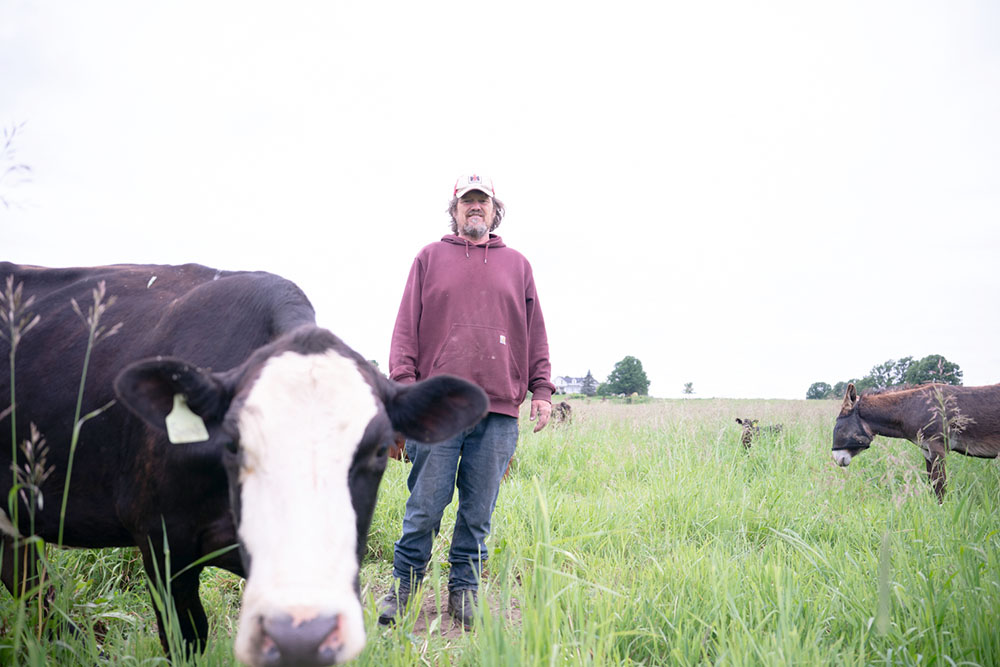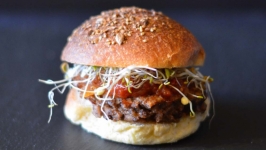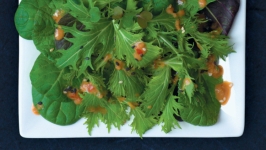Back to the Future
Quite quickly as you leave the city to the east of Ottawa, subdivisions turn to farmers’ fields. Drive a little further and the cash crops that line the highway towards Montreal give way to smaller family farms nestled in the folds of land off the dirt roads. It’s on one of these 196-acre parcels of land, not far from Maxville, that you’ll find Kirkview Farms, where Mike MacGillivray looks after the pastures, the woodlands, the wetlands and the animals that live there. He’s the eigth generation of his family to do so.
While MacGillivray grew up on the farm and would skip school any chance he got to drive a tractor, he was discouraged from going into the business by his father, who had struggled through the farming crisis of the 1980s. He left the area after high school to go to Northern College to take Welding Engineering Technology, then ended up working in the oil and gas industry in the United States. A health scare and the list of potential pharmaceuticals his doctor recommended ultimately brought him back to the farm.
“I was travelling a great deal in China,” he recalls, “where small scale local food production still exists. I ate everything and was never sick. Then I’d always get sick when I came back to the U.S. Suddenly, I understood the importance of a clean diet and the microbiome.”
In 2018, he moved back to the family farm, “as the farming bug in me never died.” He brought together the two halves, one part previously farmed by his father using conventional methods to produce cash crops, and the other half farmed using no chemical inputs by his grandfather. MacGillivray now raises beef cattle, sheep, heritage pigs, goats, ducks, chickens and turkeys with an organic, regenerative approach to land management. “We are aiming to be your one-stop shop for organically raised proteins,” he says.
In a nutshell, MacGillivray’s approach is all about allowing nature to take the lead. His input to bringing this farm back to life is to observe very closely what’s needed and then supply it in the most natural way possible, mostly by animal husbandry and sowing plants and seeds that regenerate the soil and replace the minerals that are missing.
“There are too many wild strawberries in here,” he says, indicating little patches of spring white flowers. “That means the soil needs lime,” he explains. He’ll address other soil imbalances such as a lack of nitrogen by planting legumes or running chickens over a field.
“Taproot plants [dandelion, chicory, plantain] help break up compaction and bring minerals to the surface. We plant chicory and radish to deal with compaction in our fields. Soil needs to breathe so the microbes will flourish,” he explains.
“If there is a lack of carbon, we put in plants that create a heavy biomass. We can use Sudan grass to increase mycorrhizal fungi. The goal is diversity in plants, which gives diversity in the root interaction. What is happening below the ground is just as, or more, important than what is happening above.”
However, the most important regenerative agents are the cows. “It’s a symbiotic relationship between the cows and the plant root exudates,” he explains. Plant root exudates are organic compounds emitted through the roots of plants. These secretions influence the rhizosphere around the roots to inhibit harmful microbes and promote growth.
Between the seven Jersey cows he keeps for supplying milk as surrogate mothers to orphaned or rejected calves, to the 250-plus head of Hereford, Simmental and Lowline Angus beef cattle elsewhere on the property, it’s the cows that are doing the heavy lifting, while MacGillivray moves fences. It’s a very simple idea; if you don’t over-graze a grass field, it will provide everything a cow needs to grow into a healthy adult. This means that MacGillivray allows his cows to graze off about one third of the grass in any given strip of land before he moves them onto fresh pastures. The cows graze and poop, leaving behind valuable fertilizer. Then they move, twice daily, and will not return to that same patch for a minimum of 45 days, ideally as long as 60 days. This means he spends time on foot with his cows every day. They’re friendly and very relaxed as a result, happy for visitors to wander among them. The cows are out on pasture from mid-May to mid-December, then in a yard and barn close to the house over the winter months, feasting on organic hay. “They’re 100 per cent grass-fed organic cattle,” MacGillivray says.
As the farm has slowly started to regenerate, MacGillivray has noticed a huge increase in the diversity of wildlife that calls the spot home. “There are now snakes, toads, foxes, coyotes and many more bugs,” he observes. ‘When I ride my bike down the laneway, I get mouthfuls of them, but when I turn out onto the road, they’re gone.”
Elsewhere on his land, MacGillivray keeps 30 Katahdin Dorper sheep — those with hair not wool — six Tamworth, Hereford, Berkshire cross pigs and one boar, 20 meat goats and a bunch of energetic Nigerian dwarf goats, which his wife Cora says they have “for shits and giggles.”
There’s also a bunch of winged residents; Gibbs Honey keeps a wall of beehives close to the woodland at the back of the property, while MacGillivray keeps turkeys, a bunch of ducks and a large flock of chickens, both for meat and eggs. The majority of sales are farm gate, through a shop, lined floor to ceiling with fridges and freezers. He will deliver to Ottawa, “but prefer folks to come to the farm so they can see how their food is being raised, so that they know they are getting good food.”
For MacGillivray, Kirkview Farms is about nature. “We work with nature, not against it. So, a fuel shortage doesn’t have any impact on my operation,” he explains with a shrug. “We need more small scale, family farms to build the local food networks again. We are looking backwards to go forwards,” he says, referring to the farming principles of years passed, that he now follows in the 21st century. “I just wish the farming industry would stop trying to solve biological problems with chemistry.”
Kirkview Farms
0921 Laggan Glenelg Rd., Dalkeith, Ont.
kirkviewfarms.ca | 289.680.8684 | @kirkviewfarms












